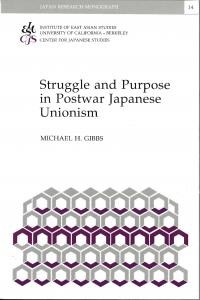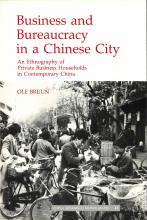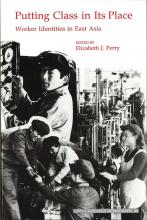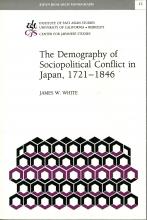Struggle and Purpose in Postwar Japanese Unionism
Struggle and Purpose in Postwar Japanese Unionism
Michael H. Gibbs
Status, purpose, and lineage are the themes of this study of the postwar Japanese labor movement. Between 1943 and 1984, Japan went from being a vast empire to a defeated, occupied, and outcast nation. Men and women from a much broader segment of society than ever before participated in the postwar struggle to define a new purpose for Japanese politics. This study looks at individual behavior motivated by this search for high purpose and examines cases differing by status, age, and experience.
As a nonprofit academic press, we need your support to publish our books. Your gift can help us make more of our titles available as e-books. DONATE NOW
Title information
Status, purpose, and lineage are the themes of this study of the postwar Japanese labor movement. Between 1943 and 1984, Japan went from being a vast empire to a defeated, occupied, and outcast nation. Social transformation lowered the barriers of status and class, and economic restructuring reoriented industry from wartime to peaceful production. Unionists ensured their eligibility for participation in the national political discourse of the 1950s and 1960s by demonstrating their sense of high purpose in the debates of the late 1940s. Men and women from a much broader segment of society than ever before participated in the postwar struggle to define a new purpose for Japanese politics. This study looks at individual behavior motivated by this search for high purpose and examines a variety of cases, differing by status, age, and experience.
Michael H. Gibbs
Michael H. Gibbs is associate professor of history at the University of Denver.
Ph.D. University of California, Berkeley
Struggle and Purpose in Postwar Japanese Unionism (JRM 14)
Acknowledgments – vii
Introduction – ix
1. Old Purpose Frustrated and Old Loyalties Challenged, 1943–1947 – 1
Rewards of Imperial Service – 1
Sacrifices at the End of Empire – 9
Soldiering on in the Wake of Defeat – 13
Taking Charge – 19
Restrictions on Loyal Action – 25
2. Purpose Redirected, 1945–1947 – 28
Difficulties with Benevolence – 29
Righteousness Refocused – 32
Radical Purposes – 39
Tug of War over Purpose – 48
Further Radicalization of Purpose – 59
Difficulties for Radicalism – 67
3. In Search of New Purpose, 1946–1949 – 72
Loosed Cannon – 72
Unionism Transformed – 79
The Discourse of Democratization – 88
Unionism Reaching Higher – 100
Highest Purpose – 112
Sights Lowered – 123
4. At Cross Purposes, 1950–1954 – 139
Fragmentation on Purpose – 139
Assertion of Superiority – 148
Finding a Cause – 154
Labor Agreements – 163
Higher Purpose in Public Office – 168
Opposition to Rationalization – 175
5. The Purpose of Unionism, 1955–1963 – 190
Competing Lineages within the Labor Movement – 191
Struggle and Its Consequences – 207
Heroes of Industry – 213
Finding Purpose in Struggle – 218
Purpose of Lineage – 227
6. Struggle over History, 1964–1984 – 229
Individual Purpose – 230
Steel for the Nation – 241
Alienation and Exploitation – 248
Charges of Corruption – 259
Traditions of Labor Militancy – 266
Taking Labor Seriously – 272
Glossary 1: Individuals Discussed – 283
Glossary 2: Terms, Institutions, Organizations – 285
Bibliography – 310
Index – 319
|
JOURNAL REVIEWS |
|
"Gibbs's analysis of labor relations is a welcome addition to studies of labor relations in Japan as well as comparative labor history….[He] pays attention to the sense of purpose held by union activists and managers, and examines how struggles among actors with different senses of purpose influenced the development of labor relations in the steel firms. Another contribution of this book is that it gives a detailed account of two issues that have tended to be overlooked in previous studies of Japanese labor relations, especially in English language publications: the influence of wartime experience of workers on their subsequent commitment to union activities, and the active role of white-collar staff in the labor movement in the early postwar days." ~Akira Suzuki, Hosei University, in The Journal of Asian Studies (http://www.jstor.org/stable/2700063) |




